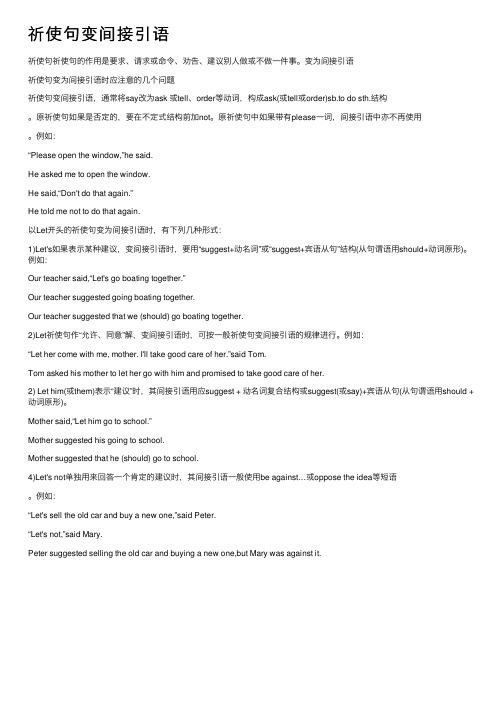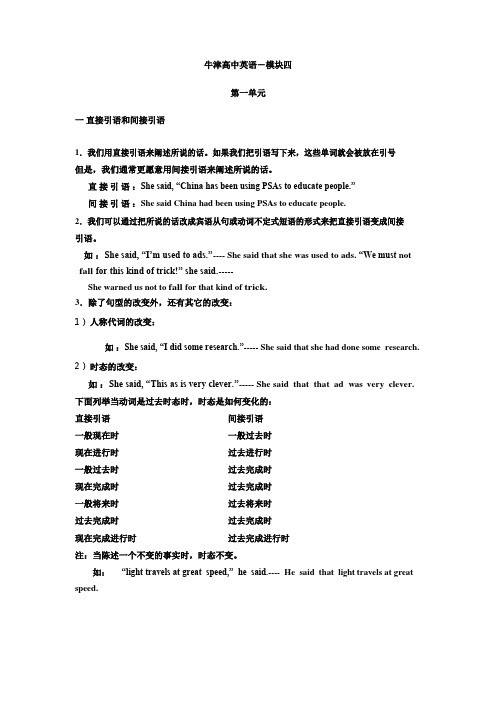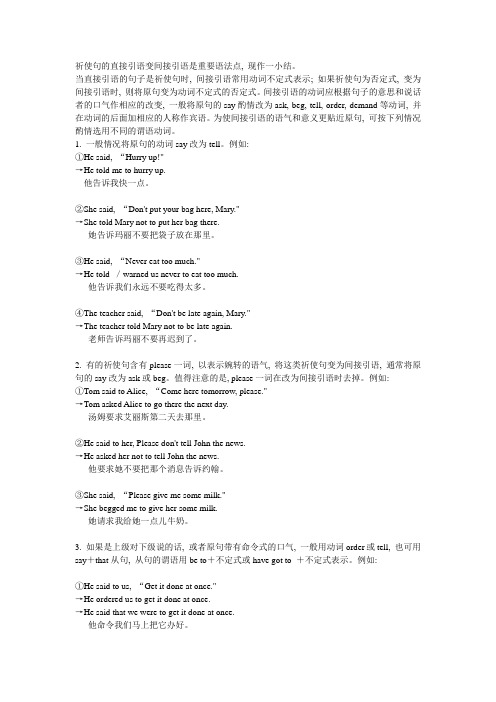译林牛津版高中英语必修四语法讲解--祈使句变间接引语
祈使句变间接引语

Command and Request
Open your books.
command
Please open your books. request (polite)
My grandma told me to stay there until the
following day.
注意:省去的主语 需补出
2. 直接引语是表示建议的祈使句, 变间 接引语时,可以用advise,suggest 等词 转叙。
advise sb to do sth advise that… (should) do sth suggest doing sth suggest that… (should) do sth
4. She said, “I am very happy to help you.”
She said that she was very happy to help you.
5. “Don’t cry any longer,” the mother said the little girl.
The mother told the little girl not to cry any longer. 6. “Wait for me , please,” the boy said to his father.
直接引语是表示建议的祈使句: He said, “Let’s go to the cinema.” He suggested going to the cinema. (suggest) He suggested that we should go to the cinema. He advised us to go to the cinema. (advise) He advised that we should go to the cinema.
祈使句变间接引语

祈使句变间接引语祈使句祈使句的作⽤是要求、请求或命令、劝告、建议别⼈做或不做⼀件事。
变为间接引语祈使句变为间接引语时应注意的⼏个问题祈使句变间接引语,通常将say改为ask 或tell、order等动词,构成ask(或tell或order)sb.to do sth.结构。
原祈使句如果是否定的,要在不定式结构前加not。
原祈使句中如果带有please⼀词,间接引语中亦不再使⽤。
例如:“Please open the window,”he said.He asked me to open the window.He said,“Don't do that again.”He told me not to do that again.以Let开头的祈使句变为间接引语时,有下列⼏种形式:1)Let's如果表⽰某种建议,变间接引语时,要⽤“suggest+动名词”或“suggest+宾语从句”结构(从句谓语⽤should+动词原形)。
例如:Our teacher said,“Let's go boating together.”Our teacher suggested going boating together.Our teacher suggested that we (should) go boating together.2)Let祈使句作“允许、同意”解,变间接引语时,可按⼀般祈使句变间接引语的规律进⾏。
例如:“Let her come with me, mother. I'll take good care of her.”said Tom.Tom asked his mother to let her go with him and promised to take good care of her.2) Let him(或them)表⽰“建议”时,其间接引语⽤应suggest + 动名词复合结构或suggest(或say)+宾语从句(从句谓语⽤should +动词原形)。
牛津译林版 Module4Unit1语法梳理(直接引语和间接引语)

直接引语和间接引语考情分析直接引语变间接引语是中学英语教学的重点语法之一。
间接引语在多数情况下都含一个宾语从句,直接引语变间接引语时,人称、时态、指示代词、时间状语、地点状语、标点符号、大小写、语序等都要作相应变化。
引述别人的话有两种方式:一是使用引号引出别人的原话,这叫做直接引语;一是用自己的话把别人的话转述出来,这叫做间接引语。
在直接引语向间接引语转换的过程中,不仅要进行句式上的转换,而且常常要在时间,地点、人称等方面做相应的转换。
1.直接引语变间接引语时,人称变化遵循“一主、二宾、三不变”的规律。
如:Li Lin said to Xiao Li,“I’ll help your brother with his Chinese.”Li Lin told Xiao Li he'd help her brother with his chinese.一主:句中第一人称I改成与主句语Li Lin相应的人称he;二宾:句中第二人称your改成与主句宾语XiaoLi相应的人称her;三不变:句中第三人称his无须改变。
2.若直接引语是祈使句,则可根据以下口诀变为间接引语:“去掉引号要加to,ask,order须记住;直接引语若否定,not加在to前面”。
如:Mary said to her mother,“Please give me some money.”Mary asked her mother to give her some money.名师点睛当祈使句的直接引语变为间接引语时,因为祈使句表示“请求、命令”等口气,所以祈使句直接引语变为间接引语时不存在时态的变化。
但是人称、指示代词、时间、地点状语等的变化还应根据陈述句直接引语变间接引语的方法进行相应的改变。
3.直接引语变间接引语时引述动词的选择视内容而定:表示“命令”时用tell、order、command;表示“请求”时用ask、beg、request;表示“忠告”时用advise、urge;表示“建议“时用suggest。
陈述句与祈使句的间接引语详细解析陈述句与祈使句的间接引语的变化与表达方式

陈述句与祈使句的间接引语详细解析陈述句与祈使句的间接引语的变化与表达方式陈述句与祈使句的间接引语详细解析间接引语是将别人的言论或陈述转述出来,而不是直接引用原来的话语。
对于陈述句和祈使句而言,其间接引语的变化和表达方式有一些特点和规则,下面将对其进行详细解析。
1. 陈述句的间接引语变化与表达方式陈述句是用来陈述或描述一个事实、情况或观点的句子。
当将陈述句变为间接引语时,一般需要对人称、时态、指示代词和时间状语等进行相应的变化。
1.1 人称变化当将第一人称陈述句转述时,需将其变为第三人称。
例如,原陈述句为:“我喜欢这本书。
”,转述为间接引语时应改为:“他说他喜欢那本书。
”当将第二人称陈述句转述时,需根据上下文和语境来确定称谓的变化。
例如,原陈述句为:“你会来吗?” 转述为间接引语时可以改为:“他问我是否会来。
” 或“他问她是否会来。
”1.2 时态变化当将陈述句转述为间接引语时,需根据上下文和要求来确定时态的变化。
一般情况下,时态会向过去进行转变。
例如,原陈述句为:“我去过那个城市。
”,转述为间接引语时应改为:“他说他去过那个城市。
”1.3 指示代词变化当陈述句中含有指示代词时,在转述为间接引语时需根据具体情况进行变化。
例如,原陈述句为:“这是我的手机。
”,转述为间接引语时可以改为:“他说那是他的手机。
”或者改为:“他说这是他的手机。
”取决于转述时的具体语境。
1.4 时间状语变化当陈述句中含有时间状语时,转述为间接引语时需根据具体情况进行变化。
例如,原陈述句为:“我明天要去看电影。
”,转述为间接引语时应改为:“他说他明天要去看电影。
”2. 祈使句的间接引语变化与表达方式祈使句是用来表达请求、命令、建议等的句子。
转述祈使句时,需根据具体语境和要求进行相应的变化。
2.1 去除祈使句主语在转述祈使句时,一般会去除祈使句的主语,而将其转化为一般陈述句的形式。
例如,原祈使句为:“你下午来我办公室一趟。
”,转述为间接引语时可以改为:“他请我下午去他办公室一趟。
高一英语牛津译林版必修四 unit 1 grammar 直接引语和间接引语(练习含答案)

直接引语和间接引语总分:100分一、单项填空。
(每小题4分,共40分)1. He asked ________ for the computer.A. did I pay how muchB. I paid how muchC. how much did I payD. how much I paid2. “Have you seen the film?” he asked me.→He asked me _______.A. had I seen the filmB. have I seen the filmC. if I have seen the filmD.whether I had seen the film3. “Please close the window,” he said to me.→He ______ me _____ the window.A. said to; to closeB. told to; closingC. asked ; to closeD. said to; please close4. “I am a teacher,” Jack said.→He said _________.A. that I am a teacherB. I was a teacherC. that he is a teacherD. he was a teacher5. He said, “Mother, the boy is very naughty.”→He _______ very naughty.A. said his mother that the boy wasB. said to his mother that the boy isC. told his mother that the boy wasD. spoke to his mother that the boy was6. “You’ve already got well, haven’t you?” she asked.→She asked ________.A. if I have already got well, hadn’t youB. whether I had already got wellC. have I already got wellD. had I already got well.7. He asked , “ Are you a Party member or a League member?”→He asked me _________.A. am I a Party member or a League memberB. was I a Party member or a League memberC. if I was a Party member or a League memberD. whether was I a Party member or a League member.8. He asked, “How are you getting along?”→He asked _______.A. how am I getting alongB. how are you getting alongC. how I was getting alongD. how was I getting along9. He asked me ________ with me.A. what the matter isB. what the mater wasC. what’s the matterD. what was the matter10. He said, “Don’t do that again.”→He _______ me _______ that again.A. said to me; not to doB. said to me; don’t doC. told me; don’t doD. told me; not to do二、把下列直接引语转变为间接引语。
高考英语一轮复习:牛津译林版模块四各单元语法点总结

牛津高中英语-模块四第一单元一直接引语和间接引语1.我们用直接引语来阐述所说的话。
如果我们把引语写下来,这些单词就会被放在引号但是,我们通常更愿意用间接引语来阐述所说的话。
直接引语:She said, “China has been using PSAs to educate people.”间接引语:She said China had been using PSAs to educate people.2.我们可以通过把所说的话改成宾语从句或动词不定式短语的形式来把直接引语变成间接引语。
如:She said, “I’m used to ads.”---- She said that she was used to ads. “We must not fall for this kind of trick!” she said.-----She warned us not to fall for that kind of trick.3.除了句型的改变外,还有其它的改变:1)人称代词的改变:如:She said, “I did some research.”----- She said that she had done some research. 2)时态的改变:如:She said, “This as is very clever.”----- She said that that ad was very clever.下面列举当动词是过去时态时,时态是如何变化的:直接引语间接引语一般现在时一般过去时现在进行时过去进行时一般过去时过去完成时现在完成时过去完成时一般将来时过去将来时过去完成时过去完成时现在完成进行时过去完成进行时注:当陈述一个不变的事实时,时态不变。
如:“light travels at great speed,” he said.---- He said that light travels at great speed.3)时间和地点状语的变化:如:Tom said, “I am working here today.”----- Tom said he was working there that day.下面列举这种变化的例子:直接引语间接引语today that day/ yesterday / on Wednesday, etc.tomorrow the next day / the following day / on Thursday, etc.yesterday the day before / the previous day/ on Tudesay,etc. nextmonth the month after/ the following month / in July,etc. lastyear the year before / the previous year, etc.a week ago a week before / a week earlier,etc.4)其它的例子:直接引语间接引语this thatthese thosecome go二间接引语:陈述句,疑问句和祈使句1.陈述句1)我们用that引导的名词性从句来陈述一件事。
高考英语专题之祈使句的直接引语变间接引语

高考英语专题之祈使句的干脆引语变间接引语一、教学内容祈使句的干脆引语变间接引语二、学问精讲(一)视察下列句子,试着总结、思索祈使句的干脆引语变间接引语的规律。
1. “Make sure the door is shut,” she said to her little son.She told her little son to make sure the door was shut.2. “Don’t smoke in the room,” he said to me.He told me not to smoke in the room.3. Mrs. Hill said, “ please sing at our party, Mary.”Mrs. Hill asked Mary to sing at their party.4. He said to the girl, “Do it at once.”He told the girl to do it at once.总结:祈使句的干脆引语变为间接引语的规律1. 一改:主句谓语动词干脆引语为祈使句,变为间接引语时,谓语动词said/said to常改成ask, advise, tell, warn, order, request等。
2. 二变:呼语变宾语3. 三加:动词前加to4. 四去:please(二)祈使句变为间接引语后,就成了以不定式短语形式出现的宾语补足语,其结构通常为:ask/ advise/ tell/warn/order/ request sb. (not ) to do sth.例:He said,“Be seated, please. ” →He asked us to be seated.She said to me, “Don’t smoke in the classroom.”→She told me not to smoke in the classroom.即学即用:Mary asked me _____ to answer that letter.A. don’t forgetB. not forgetC. not to forgetD. not forgetting答案:C▲留意:1. 有些含有“建议”、“劝说”的祈使句,可用suggest, insist, offer等动词转述。
祈使句的直接引语变间接引语讲解

祈使句的直接引语变间接引语是重要语法点, 现作一小结。
当直接引语的句子是祈使句时, 间接引语常用动词不定式表示; 如果祈使句为否定式, 变为间接引语时, 则将原句变为动词不定式的否定式。
间接引语的动词应根据句子的意思和说话者的口气作相应的改变, 一般将原句的say酌情改为ask, beg, tell, order, demand等动词, 并在动词的后面加相应的人称作宾语。
为使间接引语的语气和意义更贴近原句, 可按下列情况酌情选用不同的谓语动词。
1. 一般情况将原句的动词say改为tell。
例如:①He said, “Hurry up!"→He told me to hurry up.他告诉我快一点。
②She said, “Don't put your bag here, Mary."→She told Mary not to put her bag there.她告诉玛丽不要把袋子放在那里。
③He said, “Never eat too much."→He told /warned us never to eat too much.他告诉我们永远不要吃得太多。
④The teacher said, “Don't be late again, Mary."→The teacher told Mary not to be late again.老师告诉玛丽不要再迟到了。
2. 有的祈使句含有please一词, 以表示婉转的语气, 将这类祈使句变为间接引语, 通常将原句的say改为ask或beg。
值得注意的是, please一词在改为间接引语时去掉。
例如:①Tom said to Alice, “Come here tomorrow, please."→Tom asked Alice to go there the next day.汤姆要求艾丽斯第二天去那里。
- 1、下载文档前请自行甄别文档内容的完整性,平台不提供额外的编辑、内容补充、找答案等附加服务。
- 2、"仅部分预览"的文档,不可在线预览部分如存在完整性等问题,可反馈申请退款(可完整预览的文档不适用该条件!)。
- 3、如文档侵犯您的权益,请联系客服反馈,我们会尽快为您处理(人工客服工作时间:9:00-18:30)。
表示命令、请求的句子的间接引语语法点拨概念引入“L ook at this example” the teacher said to us. →The teacher told us to look at the example.“Would you like to see my flat?” she asked→She asked me to see her flat祈使句的间接引语11. 直接引语为祈使句时,改为间接引语,多用带to的不定式表达,谓语动词常是ask, advise, tell, warn, order, request等。
如:The hostess said to us,“Pl ease sit down.”女主人跟我们说:“请坐。
”→The hostess asked us to sit down. 女主人请我们坐下。
Father said to him, “Go away!”父亲对他说:“走开!”→Father ordered him to go away. 父亲命令他走开。
2. 注意祈使句如果是否定句,not多放在to do sth. 前。
He said, “Don’t mak e so much noise, boys.”他说:“孩子们,别弄出这么多噪音。
”→He told the boys not to make so much noise. 他告诉孩子们不要弄出这么大噪音。
3. 祈使句变成间接引语中,相应的时间状语、地点状语、人称、时态及动词等都要作相应的变化。
Mother said to me, “Com e back before 10:00.”母亲对我说:“十点前回来。
”→Mother told me to go back before 10:00. 母亲让我十点前回来。
She said to us, “Don’t drink this water.” 她对我们说:“不要喝这个水。
”→She ordered us not to drink that water. 她命令我们不要喝那水。
4. 有些含有“建议”、“劝告”的祈使句,可用suggest, insist, offer等动词转述,如:He said, “Let’s have a rest.” 他说:“咱们休息一会儿吧。
”→He suggested our having a rest. 他建议我们休息一会儿。
He said, “Let me help you.” 他说:“让我帮你吧。
”→He offered to help me. 他表示愿意帮我。
祈使句的间接引语21. 当直接引语形式上是表示请求、建议的疑问句,可用ask sb to do sth. /suggest doing/ advisesb. to do sth. 等形式转述。
“Would you mind opening the door?” he asked. 他问:“你介意打开窗户吗?”→He asked me to open the door. 他让我打开窗户。
“Would you please pass me the book?” s he said to me.她对我说:“请递给我那本书好吗?”→She asked me to pass her the book. 她让我递给她那本书。
“Why not go out for a walk?” he asked us. “为什么不出去走走呢?”他问我们。
→He advised us to go out for a walk. 他劝我们出去走走。
→He suggested we go out for a walk. 他建议我们出去走走。
2. 直接引语是感叹句时,变间接引语可用what或how引导,也可用that引导,如:She said, “What a lovely day it is!” 她说:“多好的天气啊!”→She said what a lovely day it was. 她说天气多么好啊。
→She said that it was a lovely day. 她说这是一个好天气。
【直接引语变间接引语】※步骤小结直接引语是祈使句变间接引语的:1.said/said to变成begged/ advised / asked/ told/ ordered/ warned等可跟不定式作宾补的动词。
2. 呼语变宾语,please要去掉。
3. Let’s 开头的祈使句----另一种变法I said to him, “Let’s start at once.”→I suggested to him that we (should) start at once.※小练习1. The man said to me, “Please send for a doctor now !”The man ____ me ____ for a doctor ____.A. ordered…to send…thenB. told …send…nowC. asked…to send…thenD. asked…send…now2. T he mother said, “Be friendly to others, son.”The mother ______ friendly to others.A. asked her son beB. ordered her son to beC. told her son beD. told her son to be第一题选C。
根据原句的语气,第一空排除A选项;根据ask/ told sb. to do sth结构,排除B、D选项。
第二题选D;根据原句的语气,第一空排除B选项order;根据ask/ told sb. to do sth结构,排除A、C选项。
※步骤小口诀-----祈使句变为间接引语一改(主句谓语动词)二变(呼语为宾语)三加(动词前加to)四去(please)■知识延伸:常用来引导间接引语的动词与句式引述别人的话时,常用下面的动词和句式来代替say或ask。
动词+从句动词:add (又说), admit (承认), agree (同意), announce (宣布), believe (相信), boast (自夸), claim (声称), complain (抱怨), declare (宣布), deny (否认), explain (解释), insist (坚持), remind(提醒), suggest (建议), warm (警告), reply/ answer (回答), repeat (重复)等They complained that the price of books had increased.他们抱怨说书的价格提高了。
Tenyson suggested that we should buy the lady a flower. (2014 福建高考)坦尼森建议我们应该给那位女士买花。
I explained that his teacher had not seen it as a game and was very upset. (2014 湖北高考)我解释说他的老师没有把它看成游戏,感到很不安。
动词+if/ whether动词:inquire (询问), wonder (想知道)I inquired whether the train was on time. 我问火车是否准时。
Ted wondered why he was wanted by the police, but he went to the station yesterday.特德不知道为什么警方要他去,但昨天他去了警察局。
动词+ sb. to do sth.动词:advise (劝说), beg (乞求), forbid (禁止), order (命令), promise (许诺), warn (警告) The teacher ordered the class to check for errors.老师命令班里学生检查一下错误。
The boy advised the girl not to drink that liquid.那个男孩儿劝那个女孩儿不要喝那种饮料。
动词+ to do sth.动词:agree(同意),offer(提议),promise(许诺),refuse(拒绝),threaten(威胁)I refuse to answer that question. 我不愿回答那个问题。
His father threatened to beat the boy if he stole again.男孩的父亲威胁说如果他再偷东西的话,就要揍他。
动词+ doing sth.动词:admit (承认), deny (拒绝), suggestHe admits being ignorant of it. 他承认忽视了这件事。
He suggested going out for a walk. 他建议出去走走。
知识延伸:另类间接引语结构1. 转述人们确信或传说的话时,常用句式:It is / was + 过去分词(said/ believed/ reported/ known/ supposed/ ...)+ that ...People say, “Some mushrooms are poisonous.” 人们说:“这些蘑菇有毒。
”→It’s said that some mushrooms are poisonous. 据说有些蘑菇有毒。
It is reported that that famous actor has gone to Europe. 据报道那个明星去欧洲了。
2. 上面这个句型可以变成:主语+ is / was + 过去分词(said/ believed/ reported/ known/ supposed/ ...)+ to do sth.(此句型中的主语是信息所涉及的人或物)It is known that bears like honey.→Bears are known to like honey. 据说熊喜欢蜂蜜。
注意:如果所报道的事件在报道之前发生,to do sth.要用完成式。
It is said that he has finished writing another novel.→He is said to have finished writing a novel. 据说他已经写完了另一本小说。
